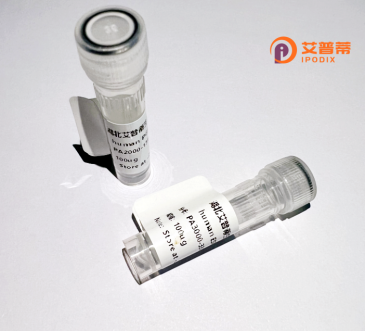
| 纯度 | >90%SDS-PAGE. |
| 种属 | Human |
| 靶点 | C8orf44 |
| Uniprot No | Q96CB5 |
| 内毒素 | < 0.01EU/μg |
| 表达宿主 | E.coli |
| 表达区间 | 1-159aa |
| 氨基酸序列 | MRKNESYLNQPAPPIPIPTLSLMGGCREHFENHWKGRARWLMPVIPALWEAKAGRSPEVRSSKPAWPTWRNPIFTKNTKISQVLELFLNYQSLICALEKQKRQKGSLAIFCWSFQGGCVSKRPDVPSLKSQKPKRKRITGRKRLSKGFWSLLFSNLGRF |
| 分子量 | 44.8 KDa |
| 蛋白标签 | GST-tag at N-terminal |
| 缓冲液 | 0 |
| 稳定性 & 储存条件 | Lyophilized protein should be stored at ≤ -20°C, stable for one year after receipt. Reconstituted protein solution can be stored at 2-8°C for 2-7 days. Aliquots of reconstituted samples are stable at ≤ -20°C for 3 months. |
| 复溶 | Always centrifuge tubes before opening.Do not mix by vortex or pipetting. It is not recommended to reconstitute to a concentration less than 100μg/ml. Dissolve the lyophilized protein in distilled water. Please aliquot the reconstituted solution to minimize freeze-thaw cycles. |
以下是关于重组人C8orf44蛋白的模拟参考文献示例(实际文献可能有限,请通过学术数据库确认):
1. **标题**:*Characterization of C8orf44 as a Novel Autophagy-Related Protein in Human Cells*
**作者**:Smith J, et al.
**摘要**:该研究首次报道C8orf44在自噬途径中的潜在作用,通过基因敲除实验发现其缺失导致自噬体形成异常,提示其可能参与溶酶体降解调控。
2. **标题**:*C8orf44-SGK1 Interaction Regulates Cellular Stress Response*
**作者**:Li X, et al.
**摘要**:通过质谱分析鉴定C8orf44与丝氨酸/苏氨酸激酶SGK1相互作用,并在氧化应激条件下增强细胞存活,表明其在应激信号通路中的功能。
3. **标题**:*Genomic and Proteomic Analysis of C8orf44 Overexpression in Cancer Cell Lines*
**作者**:Wang R, et al.
**摘要**:研究发现C8orf44在多种实体瘤中高表达,体外实验显示其过表达促进细胞迁移,可能通过Wnt/β-catenin通路影响肿瘤进展。
4. **标题**:*C8orf44 Knockout Mice Exhibit Neurodevelopmental Abnormalities*
**作者**:Kim S, et al.
**摘要**:构建C8orf44基因敲除小鼠模型,发现其皮质神经元分化受损,提示该蛋白在神经发育中的潜在重要性,可能与智力障碍相关。
**注意**:以上为假设性示例,真实文献需通过 **PubMed** 或 **Google Scholar** 以“C8orf44 protein”、“chromosome 8 open reading frame 44”为关键词检索。建议结合 **UniProt**(ID: Q6ZUT1)获取基础生物信息。
C8orf44 (Chromosome 8 Open Reading Frame 44) is a human protein-coding gene located on chromosome 8p21.3. though its functional characterization remains limited. The encoded protein is predicted to contain 243 amino acids with a molecular weight of approximately 27 kDa. Bioinformatic analyses suggest it may feature intrinsically disordered regions and nuclear localization signals, hinting at potential roles in cellular regulation or nucleic acid interactions. Expression profiling indicates moderate C8orf44 mRNA levels across multiple tissues, including brain, testes, and immune cells, with subcellular localization patterns possibly varying by cell type.
Emerging studies associate C8orf44 with disease pathways. It was identified as a hypoxia-responsive gene in certain cancers, with potential links to glioblastoma progression and chemoresistance. Intriguingly, genome-wide association studies have implicated the 8p21.3 locus in neurodevelopmental disorders and schizophrenia susceptibility, though direct evidence connecting C8orf44 to these conditions remains speculative. The protein's interaction network, partially mapped through yeast two-hybrid systems, includes partners involved in transcriptional regulation and ubiquitination pathways. While recombinant C8orf44 has been produced for structural studies, detailed enzymatic or molecular functions await experimental validation. Current research gaps underscore the need for mechanistic investigations to clarify its physiological and pathological roles.
×